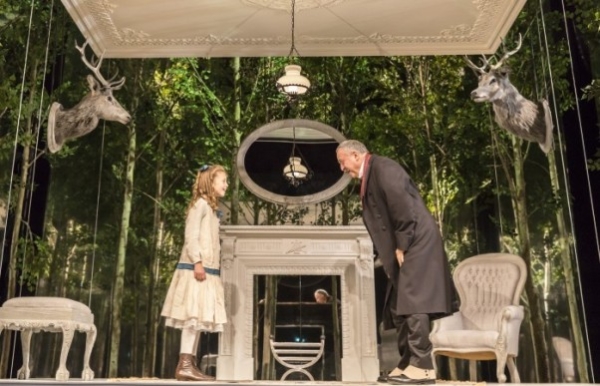The Nether (Royal Court)
Jennifer Haley’s play offers an unsettling look at online ethics and the blurred line between the virtual and the real

© Johan Persson
How does theatre talk about the internet? The two spaces would seem to be poles apart: one live, dependent on bodies gathered in a space, the other virtual and fragmented. As a result, many of theatre’s attempts to investigate the impact of this technology on our lives are clunky and quickly dated – the very opposite of their ever-evolving subject matter.
Jennifer Haley‘s unsettling play approaches online ethics via detective drama. Her protagonist, Morris, is part of a new investigative unit set up to police the Nether, the sprawling and increasingly all-consuming monster that the internet has become. The man Morris is interrogating, Sims (surely a sly, not-so-subtle reference to the computer game?), has created the Hideaway, a virtual paradise of poplars and Victorian architecture. The Hideaway’s real speciality, however, is child abuse, allowing consenting adults to adopt avatars and explore their darkest desires consequence free. Or so it boasts, at least.
In Jeremy Herrin‘s production, the Nether is a hyper-real, Instagrammed version of the drab and – it’s implied – decaying world from which its users escape. Surfaces glint and colours pop, as Es Devlin‘s mirrored design offers a visual key to the heightened sensation that this immersive virtual wonderland promises. If anything, it could go further in its dislocation from "in-world" reality. Performances are just that bit distanced and Luke Halls’ projections hint at the wireframes underneath, but too often the production feels only half committed to the shiny, sinister world it has created.
The piece feels torn, too, between the emotional turmoil of its characters – all prisoners of their own desires in one way or another – and the bigger issues it is attempting to touch upon. Haley’s concept undoubtedly owes a debt to predecessors such as The Matrix, but still it poses intriguing questions. The existence of the Hideaway pushes at the limits on consent and freedom of the imagination, while the binary relationship between real and virtual is increasingly complicated. Wrapped around it all is a chicken and egg debate about what comes first, imagination or reality. Do our dreams and desires build the foundations for our society, or is it the other way round?
The concern, however, is that the real issues at stake here are overshadowed by the headlines that inevitably lurk around its reception. Programmed at the same time as revelation upon revelation emerges out of Operation Yewtree, it’s hard not to watch The Nether through the tainting prism of recent events and focus on the spectre of paedophilia at the expense of the play’s other troubling questions. Whether or not Headlong and the Royal Court are deliberately exploiting these queasy parallels, they are impossible to entirely dismiss.
But this is not the play to address child abuse and our marred collective cultural memory. Instead, it prods at uncomfortable ideas of freedom, consequence and what happens to the edges of morality when the virtual rubs up against the real. And seen as theatre, in which avatars are not pixels but flesh and blood, it is all the more disquieting.
The Nether runs at the Royal Court until 9th August.












